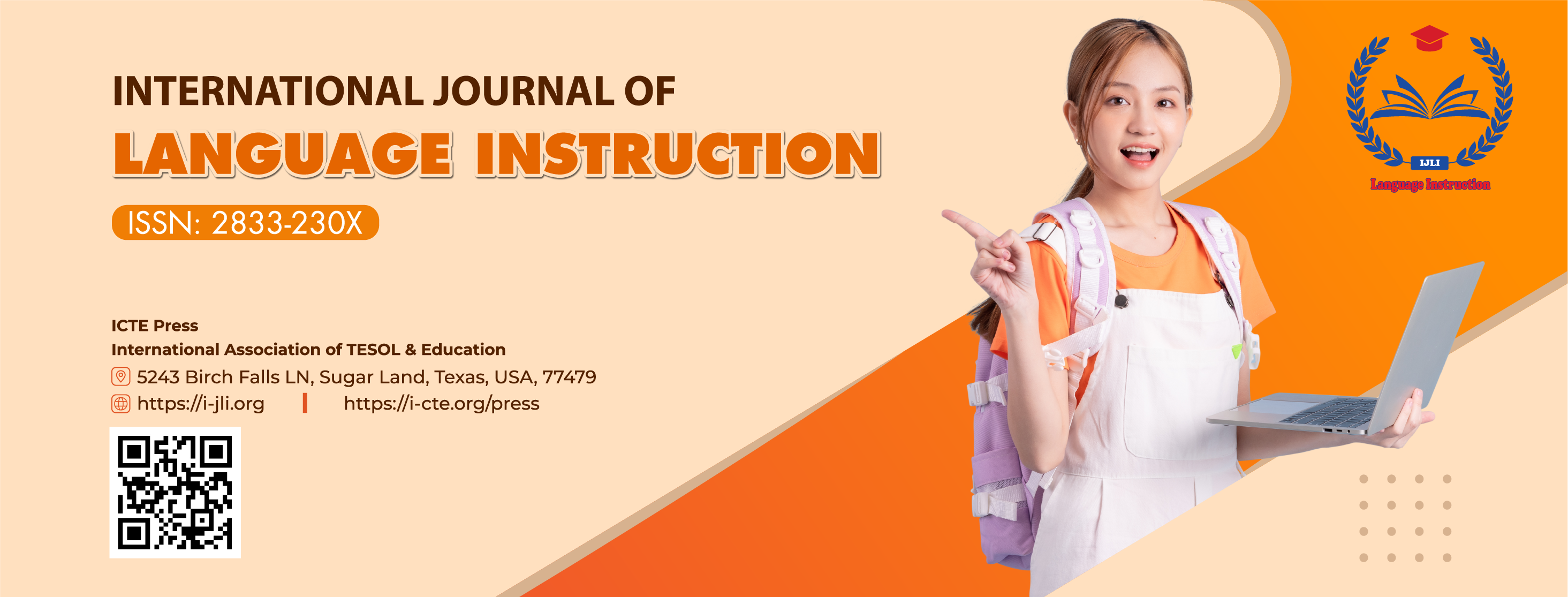EFL Students’ Perceptions towards Cooperative Learning in Writing Skills at a University in the Mekong Delta
DOI:
https://doi.org/10.54855/ijli.23232Keywords:
Cooperative Learning, writing skill, EFL students, students’ perceptionsAbstract
The cooperative learning approach to writing skills has been found to be effective in many different contexts, as evidenced by many studies. That shows us the interest of researchers in the importance of writing and the cooperative learning approach. This paper aims to review EFL students' perceptions of cooperative learning in writing skills. The participants in this study were fourteen junior non-English major students from a university in the Mekong Delta. The primary qualitative analysis reported in this paper is to show how the students perceive their learning progress in cooperative activities. The result backs up the advantages as well as disadvantages of using cooperative learning in the classroom. The participants primarily acknowledge the benefits of cooperative learning. The atmosphere for learning is made more dynamic, participative, and exploratory via cooperative learning. Responsibility at a high level is the second prerequisite for cooperative learning. Thirdly, weaker foreign language students do better when grouped with strong students. Despite the benefits, participants admitted that it would be challenging to reach a consensus when working in small groups if they had divergent or opposing ideas.References
Andrade, M. S. (2006). International students in English-speaking universities. Journal of Research in International Education, 5(2), 131–154. https://doi.org/10.1177/1475240906065589
Aldana, A. (2005). The process of writing a text by using cooperative learning. Profile Issues in TeachersProfessional Development, 6, 47–58.
Ali, W. T. (2017). Students’ attitudes towards cooperative learning (CL) in EFL writing class. Arabic Language, Literature & Culture, 2(3), 60–68.
Al-Sheedi, M. (2009). Teachers’ beliefs about using group work in basic education. Researching English Language and Teacher Development in Oman. Ministry of Education, Sultanate of Oman.
Artzt, A. F., & Newman, C. M. (1990). Implementing the standards: Cooperative learning. The Mathematics Teacher, 83(6), 448–452.
Arumugam, N., Rafik-Galea, S., Mello, G., & Dass, L. (2013). Cultural influences on group learning in an ESL classroom. Review of European Studies, 5. https://doi.org/10.5539/res.v5n2p81
Autila, R. (2017). Improving students’ writing skill of recount text through diary writing. TELL-US JOURNAL, 3(1), 45–54. https://doi.org/10.22202/tus.2017.v3i1.2527
Barkaoui, K. (2007). Teaching writing to second language learners: Insights from theory and research. TESL Reporter, 40, 14–14.
Burns, A. (1999). Collaborative action research for English language teachers. Cambridge University Press.
Chen, R. (2021). A review of cooperative learning in EFL classroom. Asian Pendidikan, 1(1), Article 1. https://doi.org/10.53797/aspen.v1i1.1.2021
Chen, R., & Hird, B. (2006). Group work in the EFL classroom in China: A closer look. RELC Journal, 37(1), 91–103. https://doi.org/10.1177/0033688206063476
Do, N. H., & Le, Q. T. (2023). Lexical collocation errors in essay writing: A study into Vietnamese EFL students and their perceptions. International Journal of Language Instruction, 2(2), 1–20. https://doi.org/10.54855/ijli.23221
Douglas, D., & Frazier, S. (2001). Teaching by principles: An interactive approach to language pedagogy.
Farzaneh, N., & Nejadansari, D. (2014). Students’ attitude towards using cooperative learning for teaching teading comprehension. Theory & Practice in Language Studies, 4(2).
Ghufron, M. A., & Ermawati, S. (2018). The strengths and weaknesses of cooperative learning and problem-based learning in EFL writing class: Teachers and students’ perspectives. International Journal of Instruction, 11(4), 657–672. https://doi.org/10.12973/iji.2018.11441a
Goodsell, A. S. (1992). Collaborative learning: A sourcebook for higher education.
Hedge, T. (2001). Teaching and learning in the language classroom (Vol. 106). Oxford university press Oxford, UK.
Ibnian, S. (2012). Group work and attitudes of non-English major students towards learning EFL. International Journal of Humanities and Social Science, 2(4), 192–197.
Johnson, D. W., Johnson, R. T., & Stanne, M. B. (2000). Cooperative learning methods: A meta-analysis.
Kagan, S. (1994). Cooperative learning. Kagan San Clemente, CA.
Kagan, S., & High, J. (2002). Kagan structures for English language learners. ESL Magazine, 5(4), 10–12.
Kessler, C. (1992). Cooperative language learning: A teacher’s resource book. Allyn & Bacon.
Larcombe, W., McCosker, A., & O’Loughlin, K. (2007). Supporting education PhD and DEd students to become confident academic writers: An evaluation of thesis writers’ circles. Journal of University Teaching and Learning Practice, 4.
Li, D., Clarke, D., & Remedios, L. (2010). Chinese students’ perception of out-of-class groupwork in Australia. The Australian Educational Researcher, 37(3), 95–112.
Li, L. Y., & Vandermensbrugghe, J. (2011). Supporting the thesis writing process of international research students through an ongoing writing group. Innovations in Education and Teaching International, 48(2), 195–205.
Maasum, T. N. R. T. M. (2007). The effects of cooperative learning on English as a second language reading performance of low proficiency undergraduates at a public university.
Meteetham, P. (2001). Case study of cooperative learning by using jigsaw technique with second-year English major students at Naresuan University. Mahidol University.
MOET. (2020). Viet Nam national Education for All 2020 review. MOET: Vietnam.
Nair, S. M., & Sanai, M. (2018). Effects of utilizing the STAD method (cooperative learning approach) in enhancing students’ descriptive writing skills. International Journal of Education and Practice, 6(4), 239–252. https://doi.org/10.18488/journal.61.2018.64.239.252
Nguyen, H. H. T. (2009). Teaching EFL writing in Vietnam: Problems and solutions-a discussion from the outlook of applied linguistics. VNU Journal of Foreign Studies, 25(1).
Nihalani, P. K., Wilson, H. E., Thomas, G., & Robinson, D. H. (2010). What determines high-and low-performing groups? The superstar effect. Journal of Advanced Academics, 21(3), 500–529.
Nunan, D. (2003). Practical English language teaching. Oxford University Press.
Oshima, A., & Hogue, A. (2007). Introduction to academic writing. Pearson/Longman.
Peregoy, S. F., Boyle, O. F., & Martinez, G. (2011). Reading, writing, and learning in ESL: A resource book for teaching K‐12 English learners.
Shammout, M. (2020). The effect of cooperative learning activities on enhancing the writing skills of Syrian EFL learners at Arab International University. Theory and Practice in Language Studies, 10(7), 791–797.
Sharan, S. (1980). Cooperative learning in small groups: Recent methods and effects on achievement, attitudes, and ethnic relations. Review of Educational Research, 50(2), 241–271.
Siddique, M., & Singh, M. K. S. (2016). Role of cooperative learning in enhancing students’ writing skills in Pakistani colleges: A review of literature. Proceedings of the ICECRS, 1(1), v1i1-641.
Slavin, R. E. (1980). Cooperative learning. Review of Educational Research, 50(2), 315–342.
Slavin, R. E. (2011). Instruction based on cooperative learning. Handbook of Research on Learning and Instruction, 358–374.
Suwantarathip, O., & Wichadee, S. (2010). The impacts of cooperative learning on anxiety and proficiency in an EFL class. Journal of College Teaching & Learning (TLC), 7(11).
Thach, T. D. (2022). Teachers’ perceptions of comprehensible input on English vocabulary acquisition. International Journal of Language Instruction, 1(1), 120–131. https://doi.org/10.54855/ijli.221110
Triviño, C., & Andrea, P. (2016). Using cooperative learning to foster the development of adolescents’ English writing skills. Universidad Nacional de Colombia., 18(1), 21–38. https://doi.org/10.15446/profile.v18n1.53079
Vo, T. T. (2022). EFL students’ attitudes towards teacher correction and peer correction in writing skills. International Journal of Language Instruction, 1(1), 155–173. https://doi.org/10.54855/ijli.221113
Downloads
Published
Issue
Section
License
Copyright (c) 2023 Phan Thi Thuy Quyen

This work is licensed under a Creative Commons Attribution 4.0 International License.
The copyright of all articles published in the International Journal of Language Instruction (ijli) remains with the Authors, i.e. Authors retain full ownership of their article. Permitted third-party reuse of the open access articles is defined by the applicable Creative Commons (CC) end-user license which is accepted by the Authors upon submission of their paper. All articles in the ijli are published under the CC BY-NC 4.0 license, meaning that end users can freely share an article (i.e. copy and redistribute the material in any medium or format) and adapt it (i.e. remix, transform and build upon the material) on the condition that proper attribution is given (i.e. appropriate credit, a link to the applicable license and an indication if any changes were made; all in such a way that does not suggest that the licensor endorses the user or the use) and the material is only used for non-commercial purposes.
Authors are able to enter into separate, additional contractual arrangements for the non-exclusive distribution of the journal's published version of the work (e.g., post it to an institutional repository, in a journal or publish it in a book), with an acknowledgment of its initial publication in this journal.











